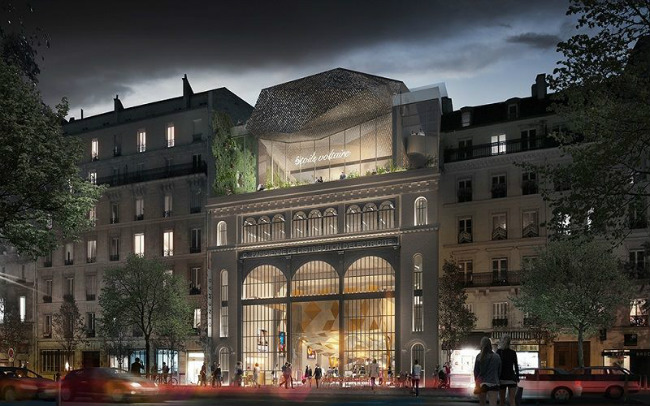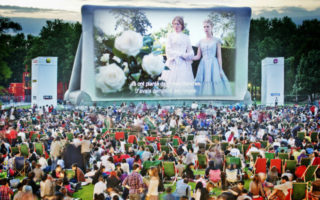The Etoile Voltaire: A Brand-New Cinéma Complex in Paris… But At What Price ?
- SUBSCRIBE
- ALREADY SUBSCRIBED?
BECOME A BONJOUR PARIS MEMBER
Gain full access to our collection of over 5,000 articles and bring the City of Light into your life. Just 60 USD per year.
Find out why you should become a member here.
Sign in
Fill in your credentials below.

Rendering courtesy of Réinventer Paris
At first glance, it sounds like fantastic news for Parisian movie buffs. A huge new movie complex is set to be built in Belleville, in eastern Paris. The city commissioned the Olivier Palatre architectural firm to re-purpose an old power station into a center with five screening rooms, a restaurant helmed by star chef Thierry Marx, and new offices for the Society of Film directors. Similar cinemas cum cultural centers on a smaller scale, like the Lucerne in the 6th arrondissement, and l’Entrepôt in the 14th, have proven to be genuine assets in their neighborhoods. The larger “cultural multiplex” MK2 Bibliothèque has become a popular venue for movie-lovers of all ages, and helped turn the BNF district into a happening place.
Yet Belleville residents are up in arms. What gives? First, as so often happens in Paris, the project was a “top-down” affair with no consultation with local residents. The municipality, architects, and the Etoile movie-theatre chain were accused of operating in an opaque manner.
Beyond the arguments about procedure is the scourge of gentrification. Much of eastern Paris has been overrun by les bobos (bourgeois bohemians). Working-class areas in Ménilmontant and Oberkampf have seen trendy cafés, restaurants, and boutiques sprout like upscale mushrooms. The Marais, the ancient Jewish neighborhood, has become mostly gentile and genteel, with more boutiques than Jewish food shops. The nearby area by République, a traditionally gritty area, is now labelled the haut Marais, or the “upper Marais”. Aside from losing their character and traditional shops, rents have skyrocketed. Locals have been forced out, and Airbnb hasn’t helped matters, despite a crackdown by the Paris housing authority.
There have been efforts over the years to gentrify Belleville as well. It is for now a mixed ethnic neighborhood, home to North Africans, Jews, Turks, Asians and Africans. The area is a magnet for people who want to shop for authentic ethnic food in a vibrant setting. Not to forget les Franco-Français, both working-class people and artists. (One well-known event has been an annual open house, where local artists open their studios to visitors.) Efforts by developers over the years to cajole tenants and small property owners out and convert buildings into plush residences have been beaten back by vociferous community action.
Cinéma Etoile Voltaire from Voltaire et Compagnie on Vimeo.
In other quartiers new cultural projects drew crowds and led to urban renewal, but also higher rents. This happened in the Les Halles district after the Pompidou Center was created in the 1970s and in the 1980s in the Bastille, when François Mitterrand ordered the building of a new opera house. The Marais’ transformation has its origins in President de Gaulle’s culture minister, André Malraux, ordering the then dingy neighborhood cleaned up in the 1960s.
Some recent renewal projects have been more dubious. A couple of years ago a shady developer made extensive plans to build “La Jeune Rue”– a complex of shops and workshops for “creative artisans” in the haut Marais. After attracting enormous media interest the project collapsed in debt and faulty accounting, apparently little more than a Ponzi scheme. A large development close to the Bastille, reconverting public buildings into commercial and residential real estate, seems more legitimate, but has drawn accusations of public-private sweetheart deals.
The local community group, Le 14 Avenue Parmentier, has been in the forefront in the opposition to the Belleville cinema project. A spokesperson for the group, Lucile Cocito, quoted in Le Monde, said that the group supported turning the present building into a “non-commercial space where citizens can come and go without having to consume”. She also said that the group opposes any drastic alteration of the present building’s architectural integrity. Le 14 Parmentier contested the city’s actions in court and improbably won a preliminary victory for procedural errors committed by Réinventer Paris (literally Reinvent Paris), the municipal body which held a competition for the re-conversion plan. A final decision is expected in a year. In the meantime, other challenges are being planned to Réinventer Paris’ initiatives. Perhaps the city should consider re-inventing its current way of doing business.
Lead photo credit : Rendering courtesy of Réinventer Paris



